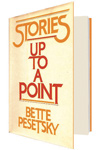Among the several titles that Gordon Lish has held over the course of his long career (teacher, author, editor, publisher), he is perhaps best known for his nearly twenty years as a fiction editor at Alfred A. Knopf. He worked on everything from Don DeLillo to David Leavitt, Cynthia Ozick to Walter Kirn. A striking number of the books he edited were story collections by women, many of them debuts: Christine Schutt’s Nightwork, Dawn Raffel’s In the Year of Long Division, Amy Hempel’s Reasons to Live, Noy Holland’s The Spectacle of the Body, Diane Williams’s The Stupefaction, Mary Robison’s Believe Them, Yannick Murphy’s Stories in Another Language, Jennifer Allen’s Better Get Your Angel On, Janet Kauffman’s Obscene Gestures for Women. (All but the Williams, Kauffman, and Robison were first books.)
Lish has a well-earned reputation as the champion of certain aesthetic principles: repetition, minimalism, radical confession, and an acoustical/structural approach to the sentence that (as Gary Lutz has reported in this magazine) he calls “consecution” (“The Sentence Is a Lonely Place,” January 2009). Nonetheless, it is difficult—and in a certain sense pernicious—to try to generalize about these books. There’s kinship between them, sure, but similarity is a long way off from uniformity; Lish’s methods have never been half so codified or rigid as his detractors have insisted they are. (If you can’t see the difference between Amy Hempel and Gary Lutz, or Mary Robison and Harold Brodkey, you’re on your own.) For those of us partial—even partisan—to this thing that it is neither precise nor fair to call the “Lish style,” the large and variegated back catalog is a deep, wide ocean in which to dive for treasure and pearls.
Let me share with you just one fine find from my expeditions: Stories Up to a Point by Bette Pesetsky. First published in 1981, Stories was Pesetsky’s first book. The narratives—fifteen of them, in a book that runs only 114 pages—are almost all in the first person, and deliver “the fragmented news of combat recollected by women whose lives have been tested against the action of time and loss and betrayal.” That’s from the jacket copy, which I’d bet my last dollar Lish wrote himself. He leaves out one major characteristic of the book—which is that it’s funny as hell—but Francine du Plessix Gray covers that ground in the book’s sole blurb (“tragicomic,” “telegraphic irony,” etc.).
Pesetsky reveals the lives of flinty, streetwise women of the mid-century Lower East Side. She’s like an alternate-dimension Grace Paley: rougher around the edges, with a most welcome mean streak: “I used to say that
I wanted a place in the country with a high barbed-wire fence. Randolph, my first husband, thought I was joking. Armel, my fifth husband, knew I was serious.” Her writing is merciless and swift.
Eastern European Jewish immigrants, communists, and other artifacts of yesteryear New York are strewn throughout. The pell-mell energy of the prose keeps you alert and enjoying yourself even as the individual stories mostly blend together. That said, “Moe, Nat, and Yrd,” “Offspring of the First Generation,” and “Care by Women” each stand as well on their own as they do in the group. “Slim yet thunderous,” wrote Lish of this volume; “a mature voice speaking with all the force of its hard-earned knowing.” Yes, and yes again.
—Justin Taylor
Jacket price of first-edition hardcover (Alfred A. Knopf, 1981): $9.50; Typeface: Bodoni Book, based upon a “composite conception” of the style of Giambattista Bodoni (1740–1813) but not on any of Bodoni’s actual types. William Morris described Bodoni’s style as “swelteringly hideous”; Representative sentence: “I am a student of people who call on the telephone to voices who talk on the radio”; Other books of stories published by Lish that have the word stories in their titles: Stories in Another Language by Yannick Murphy (1987); Stories in an Almost Classical Mode by Harold Brodkey (1988); Stories in the Worst Way by Gary Lutz (1996)





